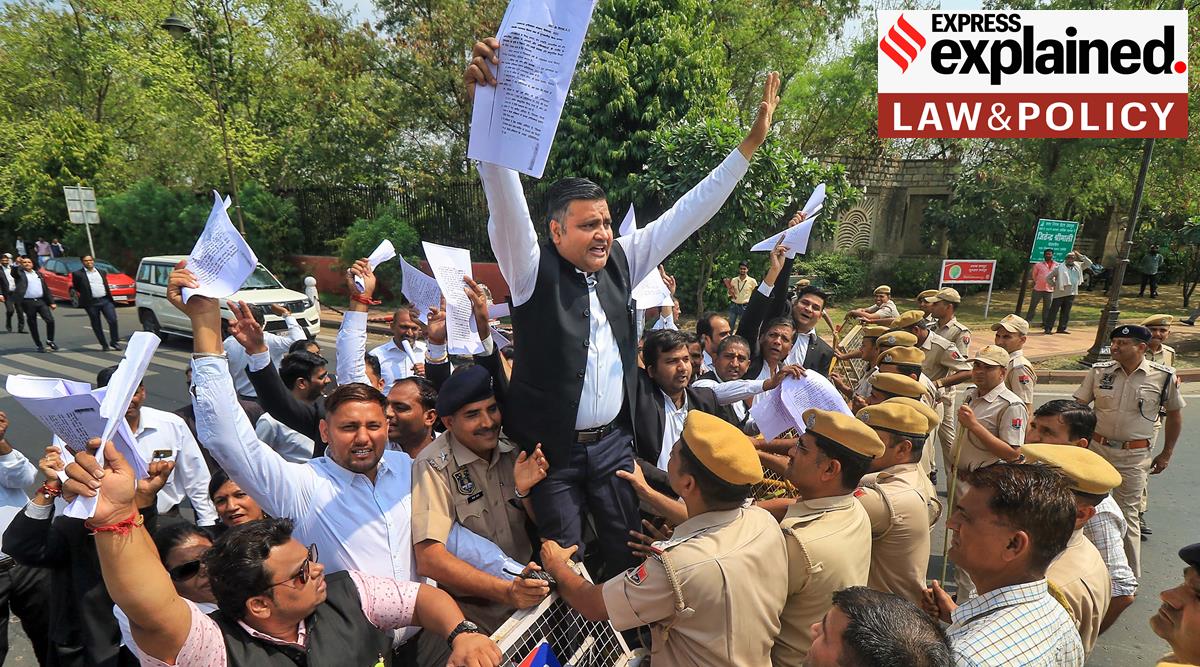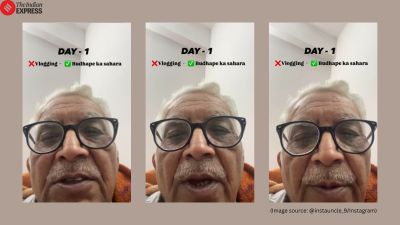Rajasthan govt tables Bill to protect advocates: Why it was introduced, what it says
The chain of events culminating in the proposal of the Rajasthan Advocates Protection Bill, 2023 in the state legislative Assembly began on February 18, when a 48-year-old Jodhpur-based lawyer, Jugraj Chauhan, was stabbed by two men in broad daylight.
 Advocates shout slogans during a protest outside the Rajasthan High Court for their demand of ' Protection Bill', in Jaipur, Friday, March 17, 2023. (PTI Photo)
Advocates shout slogans during a protest outside the Rajasthan High Court for their demand of ' Protection Bill', in Jaipur, Friday, March 17, 2023. (PTI Photo) The Rajasthan government Thursday (March 16) tabled the Rajasthan Advocates Protection Bill, 2023 in the state legislative Assembly. The Bill provides for the prevention of offenses against advocates, such as assault, grievous hurt, criminal force and criminal intimidation, along with damage or loss to their property.
Why was the Bill introduced?
The chain of events culminating in the proposal of the Rajasthan Advocates Protection Bill, 2023 in the state legislative Assembly began on February 18, when a 48-year-old Jodhpur-based lawyer, Jugraj Chauhan, was stabbed by two men in broad daylight. The incident was captured on the CCTV cameras nearby, news agency ANI reported. A day later, advocates from several courts in the state called for a strike and an indefinite boycott of judicial work. They also demanded a law for the protection of advocates and their families.
Following this, on February 28, the Rajasthan High Court took suo-moto cognizance of the lawyers’ strike and stated, “We reiterate that any attempt made to obstruct any lawyer or litigant from entering the court and appearing in the court to argue the matter shall be viewed strictly and they shall be treated as an act of obstruction in the administration of justice and suitable action would be initiated against such persons.”
On March 4, the Bar Council of India (BCI) wrote to Rajasthan Chief Minister Ashok Gehlot to expedite the framing of a law for the protection of lawyers. In its statement, the BCI asked the Rajasthan Bar Council to ensure the strike is called off, and informed about its submission of the Draft of Advocates Protection Law to the Union Ministry Of Law in 2021. In furtherance of this, the BCI stated that it would send a reminder to Union Law Minister Kiren Rijiju for an early decision on the matter, PTI reported.
What does the Bill seek to do?
The objective of the Bill is to prohibit increasing “violence” and “false implications” against advocates in the state, resulting in the “deterioration of law and order” and “delay in the justice system” by enacting an effective law that makes such offenses cognizable in the territory of Rajasthan.
Section 3 of the Bill says, “Any act of assault, grievous hurt, criminal force, and criminal intimidation against an advocate shall be an offense.” The Act also deems these offenses as “cognizable”, indicating that arrests can be made without a warrant. However, such an Act should be in connection with the “discharge of duties of the advocate in the court premises.”
The Bill aims to provide police protection to an advocate, based on a report made to the police, for the commission of offenses against him, as defined in Section 3. However, protection can only be given if the police deem it fit, and in “a manner as prescribed in the rules.”
Who can seek protection?
The Rajasthan Advocates Protection Bill, 2023, extends to “advocates” in the State of Rajasthan. The Bill assigns the term “advocate” the same meaning accorded to it under Section 2(1)(a) of the Advocates Act, 1961, which defines it as “an advocate entered in any role under the provisions of this Act.”
What is the punishment for offenses against advocates?
Section 5 deals with penalties for various offenses under the Bill. Section 5(1) punishes assault or criminal force against an advocate with a maximum of two years imprisonment, along with a fine of up to Rs 25,000. On the other hand, Section 5(2) punishes the act of voluntarily causing grievous hurt to an advocate with a maximum of seven years imprisonment and a fine of up to Rs 50,000.
Meanwhile, Section 5(3) punishes the voluntary commission of the offense of criminal intimidation against an advocate with a maximum of two years imprisonment and a fine of up to Rs 10,000. However, if the threat is intended to cause death, grievous hurt, destruction of any property by fire, or constitutes an offense punishable with death or life imprisonment, then the punishment can extend to seven years with a fine of up to Rs 20,000.
“Every offence punishable under this Act shall be compoundable by the aggrieved person with the permission of the Court,” the Bill states. Compoundable offenses are those which can be conciliated by the parties under dispute, without requiring the permission of the court.
Provisions for compensation and damages
The Bill seeks to provide compensation to advocates under Section 8, which states that, “When a Court imposes a sentence of fine or any other sentence of which fine forms a part, the Court may, when passing judgment, order such amount of the fine recovered to be paid as compensation to the advocate.”
Moreover, Section 10 states that in addition to the punishment specified in Section 5, the offender, “in appropriate cases”, shall also be liable to pay for the loss or damage caused to an advocate’s property, as may be determined by the court. The offender will also be liable to reimburse the medical expenses incurred by an advocate.
When can advocates themselves be prosecuted?
Section 9 of the Bill provides for the prosecution of advocates themselves if a report of cognizable offense is received from their client or opposing client against an act done by the advocate, during the discharge of their professional duties. The complaint may be registered only after an inquiry has been conducted by “a police officer not below the rank of Deputy Superintendent of Police” within seven days. If a case is registered, its written information shall be sent to the Bar Council of Rajasthan.
If an advocate misuses the provisions of this Act or uses them for malicious purposes or makes a false complaint under the Act, they can face imprisonment for up to 3 years, with or without a fine.
- 01
- 02
- 03
- 04
- 05





































